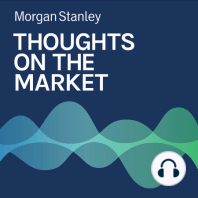3 min listen

Robin Xing: Can China’s Economy Stabilize Global Growth?
Robin Xing: Can China’s Economy Stabilize Global Growth?
ratings:
Length:
4 minutes
Released:
Sep 20, 2022
Format:
Podcast episode
Description
As the global economic outlook turns toward a slowdown in growth, some investors may look to China for stability, but, when they do, what will they find?----- Transcript -----Welcome to Thoughts on the Market. I'm Robin Xing, Morgan Stanley's Chief China Economist. Along with my colleagues, bringing you a variety of perspectives, today I will discuss whether China can stabilize global growth amid recession fears. It's Tuesday, September 20th at 9 AM in Hong Kong. The global economic outlook is dimming, and my colleagues have already discussed their expectations for slowdown in developed market economies driven by surging prices and aggressive monetary policy tightening. In this context, investors are likely to turn their attention to China, perhaps hoping it can once again stabilize global growth as it did after the 2008 global financial crisis. China's economy, however, appears to be fragile. While it has bottomed after the contraction due to Shanghai lockdown in the second quarter, it is still modeling not yet through. And we forecast a below consensus 2.8% GDP growth this year, and only a modest rebound to slightly above 5% in 2023. To date, China has deployed the monetary policy easing and the infrastructure investment spending. But these steps have not got a lot of traction because of two key hurdles; continuing COVID restrictions and the trouble in its housing market. We see growth rebounding in next year, but that recovery depends heavily on policy addressing these two key hurdles. Hence, we look for a more concerted policy response in the housing market, and a clearer path towards reopening post the upcoming 20th Party Congress in October. First, to limit the fallout from the housing sector, Beijing will likely ramp up policy support. It is true that China's aging population has pushed the housing market into a structural downward trajectory, but the pace of the recent collapse vastly exceeds that trend. The choke point is homebuyers lack of confidence in developers ability to deliver the pre-sold house, which shrinks new home sales and puts more stress on developers liquidity. We think that Beijing will provide additional funding and intervention to ensure contracted home construction is completed. This, combined with more home purchases, stimulus and the liquidity support to surviving developers could break the negative feedback loop. Second, we expect a gradual exit from COVID-zero next spring. With the more transmissive Omicron, the rolling lockdowns in China are taking their toll on consumption and even posing challenges to supply chains. The renewed lockdowns in several major cities and the recent slowdown in vaccination progress suggest that COVID-zero would not end swiftly after the Party Congress in October. But the key metrics to watch by then will be, first, the pace of vaccination, second, wider adoption of domestic covid treatment and finally shift in public opinion from fearing the virus to a more balanced assessment. Provided that policy can address these two hurdles I just described, China's economic recovery should firm up from second quarter 2023 onwards, with growth of slightly above 5% for next year are our numbers. But even with this rebound, the positives spill over to the rest of the world is unlikely to be on par with history. Construction activities might improve with the stabilizing property sector, which is a familiar driver of Chinese imports. But the key driver will be a turnaround in domestic private consumption, particularly of services, so that demand pull from other economies will be somewhat muted. Thus, while we doubt that China would tip the global economy into recession, neither do we see China at its salvation. Thanks for listening. If you enjoy the show, please leave us a review on Apple Podcasts and share Thoughts on the Market with a friend or colleague today.
Released:
Sep 20, 2022
Format:
Podcast episode
Titles in the series (100)
Andrew Sheets: For Markets, Signs, Signs, Everywhere Signs by Thoughts on the Market